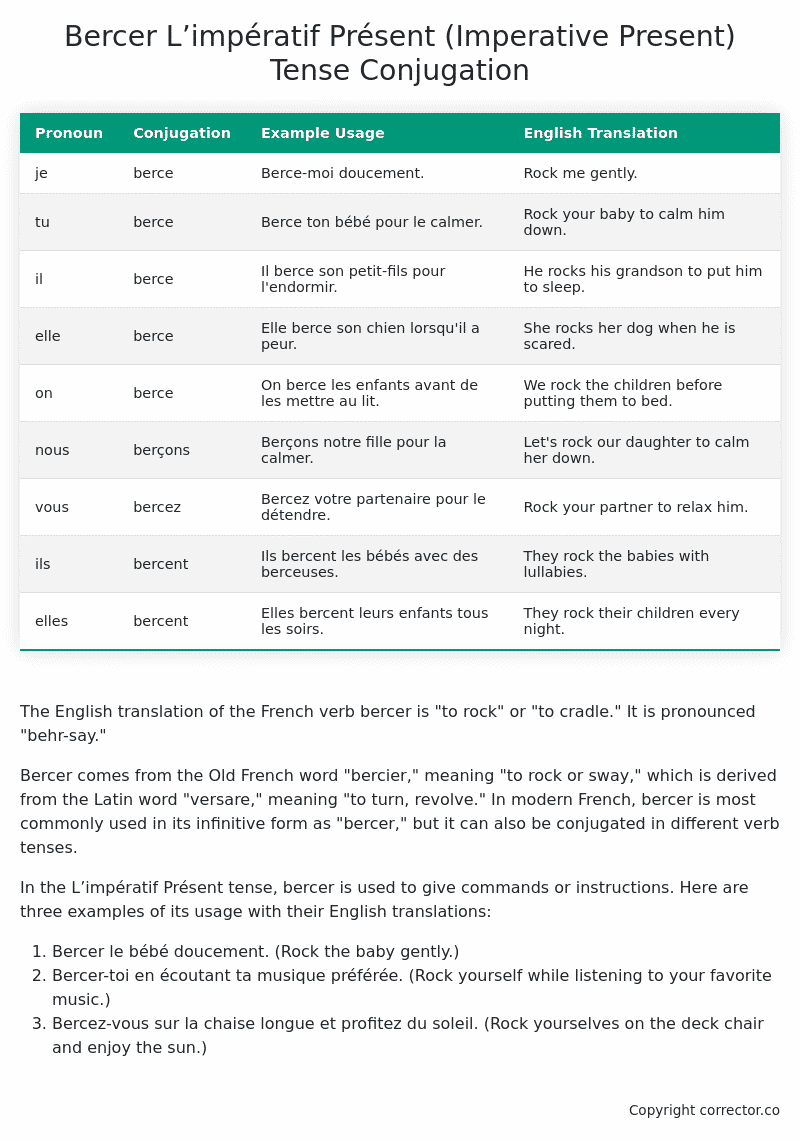L’impératif Présent (Imperative Present) Tense Conjugation of the French Verb bercer
Introduction to the verb bercer
The English translation of the French verb bercer is “to rock” or “to cradle.” It is pronounced “behr-say.”
Bercer comes from the Old French word “bercier,” meaning “to rock or sway,” which is derived from the Latin word “versare,” meaning “to turn, revolve.” In modern French, bercer is most commonly used in its infinitive form as “bercer,” but it can also be conjugated in different verb tenses.
In the L’impératif Présent tense, bercer is used to give commands or instructions. Here are three examples of its usage with their English translations:
- Bercer le bébé doucement. (Rock the baby gently.)
- Bercer-toi en écoutant ta musique préférée. (Rock yourself while listening to your favorite music.)
- Bercez-vous sur la chaise longue et profitez du soleil. (Rock yourselves on the deck chair and enjoy the sun.)
Table of the L’impératif Présent (Imperative Present) Tense Conjugation of bercer
| Pronoun | Conjugation | Example Usage | English Translation |
|---|---|---|---|
| je | berce | Berce-moi doucement. | Rock me gently. |
| tu | berce | Berce ton bébé pour le calmer. | Rock your baby to calm him down. |
| il | berce | Il berce son petit-fils pour l’endormir. | He rocks his grandson to put him to sleep. |
| elle | berce | Elle berce son chien lorsqu’il a peur. | She rocks her dog when he is scared. |
| on | berce | On berce les enfants avant de les mettre au lit. | We rock the children before putting them to bed. |
| nous | berçons | Berçons notre fille pour la calmer. | Let’s rock our daughter to calm her down. |
| vous | bercez | Bercez votre partenaire pour le détendre. | Rock your partner to relax him. |
| ils | bercent | Ils bercent les bébés avec des berceuses. | They rock the babies with lullabies. |
| elles | bercent | Elles bercent leurs enfants tous les soirs. | They rock their children every night. |
Other Conjugations for Bercer.
Le Present (Present Tense) Conjugation of the French Verb bercer
Imparfait (Imperfect) Tense Conjugation of the French Verb bercer
Passé Simple (Simple Past) Tense Conjugation of the French Verb bercer
Passé Composé (Present Perfect) Tense Conjugation of the French Verb bercer
Futur Simple (Simple Future) Tense Conjugation of the French Verb bercer
Futur Proche (Near Future) Tense Conjugation of the French Verb bercer
Plus-que-parfait (Pluperfect) Tense Conjugation of the French Verb bercer
Passé Antérieur (Past Anterior) Tense Conjugation of the French Verb bercer
Futur Antérieur (Future Anterior) Tense Conjugation of the French Verb bercer
Subjonctif Présent (Subjunctive Present) Tense Conjugation of the French Verb bercer
Subjonctif Passé (Subjunctive Past) Tense Conjugation of the French Verb bercer
Subjonctif Imparfait (Subjunctive Imperfect) Tense Conjugation of the French Verb bercer
Subjonctif Plus-que-parfait (Subjunctive Pluperfect) Tense Conjugation of the French Verb bercer
Conditionnel Présent (Conditional Present) Tense Conjugation of the French Verb bercer
Conditionnel Passé (Conditional Past) Tense Conjugation of the French Verb bercer
L’impératif Présent (Imperative Present) Tense Conjugation of the French Verb bercer (this article)
L’infinitif Présent (Infinitive Present) Tense Conjugation of the French Verb bercer
Struggling with French verbs or the language in general? Why not use our free French Grammar Checker – no registration required!
Get a FREE Download Study Sheet of this Conjugation 🔥
Simply right click the image below, click “save image” and get your free reference for the bercer L’impératif Présent tense conjugation!

Bercer – About the French L’impératif Présent (Imperative Present) Tense
Usage
Giving commands
Making requests
Offering advice
Expressing desires
Conjugation Formation
Interactions with other tenses
Want More?
I hope you enjoyed this article on the verb bercer. Still in a learning mood? Check out another TOTALLY random French verb conjugation!


